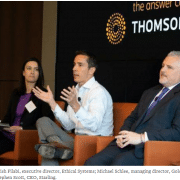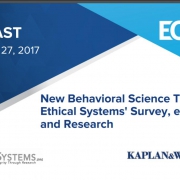Featured Ethics and Behavioral Science Scholar for June: Caroline Webb
Interview with Caroline Webb, author of How to Have a Good Day and Expert on Ethics and Behavioral Science

What are your main areas of research/work?
I show people how to use insights from behavioral science to improve their performance and wellbeing at work. In practice that often means helping them rethink the way they set goals, approach important conversations, tackle their tasks, manage their workload, handle personal setbacks and sustain their energy from day to day. Sometimes this is through 1-1 coaching and team sessions for senior leaders, but it’s often through workshops and interactive speeches for larger groups too. I also advise a couple of companies on ways to use behavioral science more broadly, including McKinsey & Company where I did behavioral change work for 12 years.
What do most companies overlook when it comes to behavioral economics, psychology, and neuroscience?
The primary focus of applied behavioral science to date has been public policy – something I applaud as a one-time policy wonk myself. But there’s a lot of untapped opportunity in business. At the moment, behavioral insights are mostly being applied by folks in the marketing function, and to a lesser extent in strategic decision-making. I’m always surprised that there isn’t more making its way into the people and culture domain, both through the HR function and in everyday management. But I’m optimistic that this will change – and it’s my mission to help change it.
Is there an argument to be made for more partnership between academic leaders and corporations? For example, this piece in the WSJ on Citibank and Princeton professor David Miller.
Of course. I was giving a talk to a business school class recently where I heard a professor say “if only we could try deploying a whole bunch of behavioral scientists to totally transform a toxic culture and see if it can be done.” Meanwhile, my organizational change consultant buddies are trying to do just that, every day, but often lacking the new insights that researchers offer. I try to act as a bit of a bridge between the two worlds in my own small way, but there’s enormous scope for more systemic collaboration.
Talk about How to Have a Good Day. What are the major takeaways for businesses as it relates to ethics and culture?
I wrote the book for individuals, but I also hoped it would seed lots of team conversations about the many tiny steps we can take to create a more positive, supportive culture in our workplaces. And I do think one meta theme running through my book is that cultural change is as much about the small stuff as about the big-ticket CEO pronouncements. You absolutely need support from the top, but culture is so strongly defined by the way we manage the day-to-day – and often, especially defined by the way we handle things when they don’t go perfectly: when people are tired, deadlines move, and mistakes happen. If you pay attention to norms around those daily challenges, you have a much stronger chance of creating an ethical high-performance culture.
On the behavioral science side, probably the biggest message comes from the research showing that people don’t behave at their best when they’re feeling defensive – and that there are predictable things that will trigger people’s defenses (typically, things that undermine their self-worth and social standing). Happily, equally predictable things will get them back into the arms of their better angels. It’s easier for people to be decent and thoughtful when they’re made to feel competent, purposeful and in control, and when they feel included, respected and treated fairly. And there are things that managers can do to make that more likely.
How can companies use the ideas in your book to develop their “speak up” culture?
My book is very specific – I think probably unusually specific – in describing step-by-step techniques that people can use to improve the depth and impact of their conversations. There’s research and real-life stories backing each of the book’s suggestions, but busy people can simply turn to the bullet-pointed advice sections if they’re short of time! I’m happy to say that I hear from many leaders who’ve used those sections to introduce their whole teams to various “speak up” techniques, e.g. on “how to raise a difficult issue,” “how to handle a disagreement,” or “how to give brain-friendly feedback”. It gives them a shared language to tackle stuff that often goes unsaid, and to do it in ways that improve their relationships rather than damage them.
How can employees draw inspiration in a difficult work culture?
It’s a good question. I have coached people working in some very difficult environments, from tough prisons to failing banks, and it can feel miserable. What I help them do is to focus on the levers they control, to help them create a positive “nanoculture” around themselves as far as possible. Their boss might be a nightmare, but I encourage them to be deliberate in deciding the attitude they want to project in each conversation, and the strengths and values they want to deploy in their work, which can give them back some sense of autonomy. Research suggests this isn’t just mental gymnastics to make people feel better, either. For example, at least one study found that people who took a moment to review their values before a meeting came across as more leader-like and competent in the meeting.
Should companies do more to make their employees “uncomfortable”? That is, how can they encourage more challenging conversations?
I do think that we’d all benefit from having more intelligent, solution-focused conversations about the things that go wrong at work. But I think there’s a big difference between “challenging” and “uncomfortable”, and I like the former a lot more than the latter. It’s entirely possible to take issue with something a colleague has done without making them feel like they’re a bad person. But the moment we make a colleague feel incompetent or disrespected, we can all too easily trigger a freeze, fight or flight response that means we’re not going to get the best quality of thought and behavior out of that colleague, given the way those defensive responses inhibit higher cognitive processes. And that usually makes it hard to get to the root of the problem and solve it. Moreover, people generally avoid uncomfortable conversations, because we’re quite deeply wired to avoid discomfort.
So companies can’t just say they want “open and honest” conversations; they also need to help their folks learn how to navigate them safely and empathetically. For example, in giving someone tough feedback, managers often inadvertently personalize and generalize, e.g. “Look, I’ve noticed that you don’t respect our process – you always take shortcuts. And it’s becoming a problem.” Even in the context of a positive working relationship, the person they’re talking to can easily bristle at this. “No I don’t – that’s not fair!” (Whether they say it out loud or in the bar later that day.) And then everyone’s mental energy goes into proving why they’re right and the other person’s wrong. But if you teach managers how to focus on specific observations of action and impact (without assuming negative intentions or bad character), you’re less likely to trigger a defensive reaction, allowing you to have a more intelligent conversation about root causes. E.g. “Last week I noticed you skipped Part 3 of the audit process. That worried me because Part 3 helps us keep track of XYZ. Tell me more about what was going on there.” You’re way more likely to fix the problem – and you might even discover that “Part 3” could be improved. This sort of thing isn’t hard to teach, but it’s surprisingly new to most managers I work with, at all levels of seniority.
If you could give one piece of management advice to companies, what would it be?
Equip all your managers with some basic behavioral science training. I would say that, wouldn’t’ I? But I do believe that in an age of increasing automation, there will be a premium on companies whose managers know enough about the human mind to be skilled in drawing wisdom, innovation and empathy out of themselves and others. We are going to need to be good at playing to those human strengths if we’re to make smart choices as robots take over more and more of our routine tasks.
If you could give one piece of advice to individuals, what would it be?
Make the most of what you can control – including your sense of purpose, your willingness to learn from mistakes, and the boundaries you set in your work. We expect a lot of our employers, and rightly so. But we have more space to define the quality of our working lives than most of us dare to exploit.
Additional Questions:
Featured Video
Additional Video
Featured Articles
- How to Tell a Co-Worker They-re Annoying You, Harvard Business Review, March 2016.
- The Science of Keeping Your Cool When Co-Workers Drive You Nuts, Quartz, April 2016.
- How Small Shifts in Leadership Can Transform Your Team Dynamic, McKinsey blog, February 2016.








